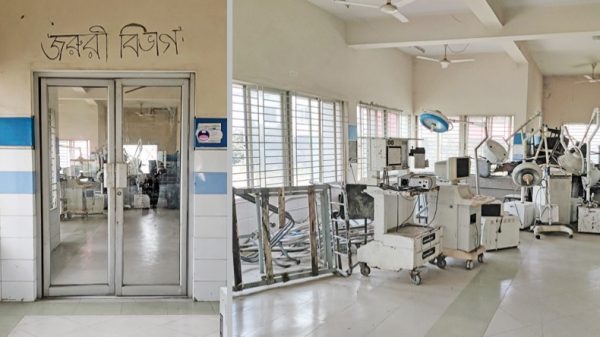Trauma centres lack emergency services

Shawdesh Desk:
Most trauma centres operating along the national highways in Bangladesh are unable to offer emergency services due to the negligence and indifference shown by the authorities.
The piled-up machines under a dust cover inside the emergency department at the trauma centre in the Shahidnagar area under the Daudkandi upazila of Cumilla, along the Dhaka-Chattogram national highway, would give testimony to how ill-equipped it was to offer services to trauma patients.
Health practitioners said that the scenario of the other trauma centres, built along the highways to provide primary treatment to trauma victims across the county, was not very different.
Even the officials of the health and family welfare ministry are in the dark about the condition of the 21 trauma centres in the country and have recently sought an update from the officials concerned to find out their actual condition.
The ministry made this inquiry after 19 people, including three bus workers, were killed and about 20 more injured when a speeding Emad Paribahan bus veered off the road and crashed into an underpass on the Dhaka–Mawa–Bhanga expressway in Madaripur on Sunday.
After the crash, the Madaripur district administration had to send 17 injured people to Dhaka Medical College Hospital, where two people died.
Despite the fact that the distance between the accident site in Madaripur’s Shibchar and the DMCH is only 50 kilometres, it took the victims several hours to reach the hospital due to heavy traffic inside Dhaka.
As per the government, there is a trauma centre at Shibchar built by the Health Engineering Department under the health ministry.
The Directorate General of Health Services line director (upazila health care), Md Rizwanur Rahman, told New Age that a meeting on Tuesday at the health ministry asked the officials concerned to give an update about the condition of all trauma centres.
The 20-bed trauma centre in Shahidnagar, near the Dhaka-Chattogram highway, was found nearly deserted during a visit in February.
On the left side of the ground floor is the nursing station, where three nurses were passing the time. The room of the in-charge on the right side was open but unoccupied, while the emergency room next door was locked.
On the first floor of the three-storied trauma centre, there is a 20-bed emergency ward with no patients. Belayet Hossain, the in-charge of the centre, came later to clarify that they only give outdoor services.
There are 20 allotted posts in the trauma centre, but Belayet said since emergency and indoor services were unavailable at the centre some of them work in the nearby Daudkandi Upazila Health Complex.
On the opposite side of the highway are the Chandgaon Government Primary School and a footbridge to facilitate students and their guardians to cross the road. Locals said road crashes were frequent there.
Chandgaon Government Primary School head teacher Md Hasan Imam told New Age on that road crashes were very frequent in the area as it was used by students of several schools located nearby.
‘The trauma centre rarely provides any benefit to accident victims. It just treats people for cough and fever,’ he said.
Since its opening in 2010, the trauma centre’s emergency unit has never been used, according to its employees.
Habibur Rahman, the residential medical officer of the Daudkandi Upazila Health Complex, which is 3.6 kilometres away from the trauma centre, said most often road accident victims on the highway come to their hospital for treatment.
‘In case of critical injuries, we send the patients to Dhaka Medical College Hospital or the National Institute of Traumatology and Orthopaedic Rehabilitation,’ he added.
Speaking to New Age over the phone, officials of trauma centres at Goaplganj near the Dhaka-Khulna highway, and Bhaluka, near the Dhaka-Mymensingh highway, said that they also did not have emergency departments in operation.
An official of the Faridpur trauma centre said that it was used only as part of the medical college.
According to the DGHS, there are total of 21 trauma centres at Dhamrai, Srinagar, Gopalganj sadar, Zajira [Shariatpur], Madhukhali [Faridpur], Faridpur sadar, Shibalay [Manikganj], Shibchar [Madaripur], Bhairab [Kishoreganj], Lohagara, Hathazari and Raujan in Chattogram, Daudkandi in Cumilla, Feni sadar, Sirajganj sadar, Ullapara [Sirajganj], Atgharia [Pabna], Sherpur [Bogura], Bahubal [Habiganj], Chhatak [Sunamganj], and Bhaluka [Mymensingh] areas.
According to Rashid-E-Mahboob, former president of the Bangladesh Medical Association, the trauma centres were only existing but not functional and lacked machinery and skilled human resources.
‘In these centres, volunteers work, but training opportunities for these volunteers are also rare in the country,’ he said.
The Centre for the Rehabilitation of the Paralysed executive director, Mohammad Sohrab Hossain, stressed the importance of emergency care facilities at the district level to prevent long-term disabilities.
Training for the doctors and the health care professionals to provide emergency care and screening facilities for road traffic accident victims were also necessary, he added.
Health and family welfare minister Zahid Maleque on March 19 in a written statement told New Age that, ‘the trauma centres are working with the upazila health complexes.’
‘As frequent road accidents, especially motorcycle accidents, are taking place, we are planning to work more on this issue,’ he added.























Leave a Reply